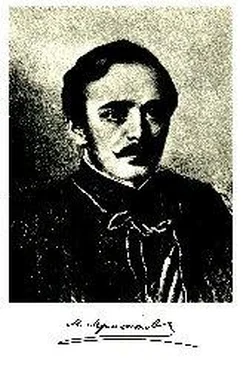Nowhere is there so much Kakhetian wine and mineral water drunk up as here.
To jumble up [103] loosely from Chatsky , or Woe from Wit (1824, 1833), a comedy by Griboyedov that was banned by the censors for political reasons. This work seems to have begun the theme of the Russian "superfluous man" that is continued here and later by many others, including Turgenev and Dostoeyevsky.
such various kinds of fun
There's many take delight: for me, I am not one.
Grushnitsky and his gang whoop it up daily in the saloon. He barely acknowledges me now.
He arrived only yesterday, but he's already managed to pick a quarrel with three old men who wanted to take their baths before him. Bad luck's decidedly developing a bellicose spirit in him.
At last they've arrived. I was sitting at the window when I heard their carriage drive up, and my heart jumped. What does it mean? Could I be in love? So senselessly am I constructed that it might indeed be expected of me.
I had dinner with them. Princess Ligovskaya eyed me very tenderly and did not leave her daughter's side-a bad sign that! But Vera is jealous of Princess Mary. I have managed to bring about that happy state after all! What would a woman not do to hurt a rival! I recall one woman who loved me simply because I was in love with another. Nothing is more paradoxical than the feminine mind. It is hard to convince women of anything-they must be brought to a point where they will convince themselves. The means of supplying evidence by which they finish off their prejudices is highly original, and to get to know their dialectic one must rid the mind of all academic rules of logic. For example, the ordinary method is this:
This man loves me; but I am married; hence, I must not love him.
The feminine method is this:
I must not love him because I am married; but he loves me, and hence...
Here follows a pregnant pause, for reason is now dumb, and all the talking is mainly done by the tongue, eyes, and eventually the heart, if there is one.
What if these notes should fall into a woman's hands some day? "Slander!" she will cry indignantly.
Ever since poets began to write and women to read them (for which they must be heartily thanked), the latter have been called angels so often that in the simplicity of their hearts they have actually come to believe in this compliment, forgetting that for money the very same poets exalted Nero as a semigod.
It might appear not quite right that I should speak of them with such malice-I, who have never loved anything else under the sun-I, who have always been ready to sacrifice my peace of mind, ambition and life for their sake... Yet it is not in a fit of annoyance or injured vanity that I try hard to draw aside that magic veil which only the accustomed eye can penetrate. No, all that I say about them is only the result of
The cold reflections [104] from Eugene Onegin, appeared in 1828.
of the mind
And bitter insights of the heart.
Women should wish all men to know them as well as I do, for I have loved them a hundred times more since I overcame my fear of them and discovered their petty frailties.
Incidentally, Werner the other day compared women with the enchanted forest described by Tasso in his Jerusalem Delivered [105] 1581 Italian poem read in French versions in Russia. See online version .
.
"You have but to approach it," he said, "to be assaulted from all sides by ungodly terrors: duty, pride, respectability, public opinion, ridicule, contempt... You must not heed them, but go straight on. Little by little the monsters vanish and before you opens a quiet, sunny glade with green myrtle blooming in its midst. But woe to you if your heart quails when you take those first steps and you turn back!"
This evening was full of many events. Some two miles out of Kislovodsk, in the gorge where the Podkumok flows, there is a crag called The Ring, forming a natural gateway that towers above a high hill. Through it the setting sun casts its last fiery glance at the world. A large cavalcade set out to watch the sunset through the rocky window. To tell the truth, though, none of us was thinking of the sunset. I rode next to Princess Mary. On the way back we had to ford the Podkumok. Even the shallowest mountain streams are dangerous, chiefly because their beds are a perfect kaleidoscope, changing day by day under the action of the current-where there was a rock yesterday, there may be a pit today. I took the princess's horse by the bridle and led it to the water, which did not rise above the knees. We started crossing slowly at an angle against the current. It is a well-known fact that in crossing rapids one should not look down at the water because it makes you dizzy. I forgot to warn Princess Mary of this.
We were already in midstream, where the current is the swiftest, when she suddenly swayed in the saddle. "I feel faint!" she gasped. Quickly I bent over toward her and put my arm around her supple waist.
"Look up!" I whispered to her. "Don't be afraid, it's quite all right; I am with you."
She felt better and wanted to free herself from my arm, but I tightened my embrace about her soft slender waist. My cheek almost touched hers. I could feel a fiery glow from her.
"What are you doing to me? My God!"
I paid no heed to her quivering confusion and my lips touched her soft cheek. She jumped, but said nothing. We were riding behind the others-no one saw us. When we clambered ashore, everyone set off at a trot. The princess, however, reined in her horse, and I remained with her. It was obvious that she was worried by my silence, but I swore to myself not to say a word-out of sheer curiosity. I wanted to see how she would get herself out of this embarrassing situation.
"Either you despise me, or you love me very much," she said at last in a voice that shook with tears. "Perhaps you wish to mock me, to play on my feelings, and then leave me... That would be so vile, so low, that the very thought... Oh no! Surely," she added with an air of tender trustfulness, "there is nothing in me that would preclude respect, is there? Your presumptuous conduct... I must, I must forgive you because I permitted it... Answer me, speak to me, I want to hear your voice!" There was so much feminine impetuosity in her last words that I could not suppress a smile; luckily, it was growing dark. I did not reply.
"You have nothing to say?" she continued. "Perhaps you wish me to be the first to say that I love you?"
I was silent.
"Do you want me to do that?" she went on, swiftly turning toward me. There was something awe-inspiring in the earnestness of her eyes and voice.
"Why should I?" I replied, shrugging my shoulders.
She struck her horse with her riding stick and set off at full gallop along the narrow, dangerous road. It all happened so quickly that I was hardly able to overtake her, and did so only when she had already joined the rest of the company. All the way home she talked and laughed incessantly. There was a feverishness in her movements, and not once did she look at me. Everybody noticed this unusual gaiety. Princess Ligovskaya rejoiced inwardly as she watched her daughter, but her daughter was merely suffering a fit of nerves and would spend a sleepless night crying. The very thought gives me infinite pleasure. There are moments when I understand the Vampire... [106] the Russians had read a French version of The Vampire: A Tale, by John Polidori (1819).
And yet I have the reputation of being a good fellow and try to live up to it!
Having got down from the horses, the ladies went in to Princess Ligovskaya's. I was agitated and galloped into the hills to get rid of the thoughts that crowded into my mind. The dewy evening breathed a delicious coolness. The moon was rising from behind the darkly looming mountains. Every step my unshod horse took echoed dully in the silence of the gorges. I watered my horse at a waterfall, eagerly drank in a few breaths of the invigorating air of the southern night, and retraced my steps. I rode through the settlement. Lights were going out in the windows; sentries on the ramparts of the fort and Cossack pickets on the outposts yelled to each other on a sustained note.
Читать дальше

![Михаил Лермонтов - A Hero of Our Time [New Translation]](/books/27671/mihail-lermontov-a-hero-of-our-time-new-translati-thumb.webp)










